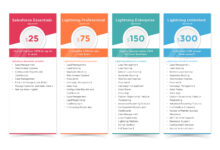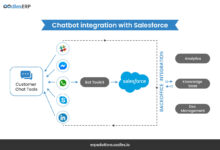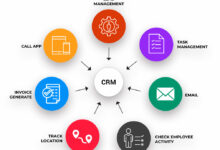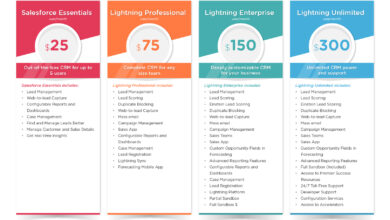CRM With AI Chatbot Integration: Revolutionizing Customer Relationships
Starting with CRM with AI Chatbot Integration, this innovative approach is reshaping how businesses interact with customers, offering personalized experiences and efficient communication. As AI technology continues to advance, integrating chatbots with CRM systems is becoming increasingly crucial for enhancing customer satisfaction and streamlining operations. Let’s delve into the world of CRM with AI chatbot integration to explore its benefits, challenges, and future trends.
Overview of CRM with AI Chatbot Integration
CRM, or Customer Relationship Management, is a software system that helps businesses manage interactions with current and potential customers. On the other hand, AI chatbots are virtual assistants powered by artificial intelligence that can simulate conversations with users. Integrating AI chatbots with CRM systems involves combining the capabilities of both technologies to enhance customer interactions and streamline processes.
Benefits of CRM with AI Chatbot Integration
- Improved Customer Service: AI chatbots can provide instant responses to customer inquiries, resolving issues quickly and efficiently.
- 24/7 Availability: AI chatbots can be available round the clock to assist customers, ensuring a seamless experience at any time.
- Personalized Interactions: By analyzing customer data stored in the CRM system, AI chatbots can deliver personalized recommendations and tailored solutions.
- Automated Workflows: Integration of AI chatbots with CRM systems can automate repetitive tasks, freeing up human agents to focus on more complex issues.
Examples of Industries Benefiting from Integration
- Banking and Finance: AI chatbots integrated with CRM systems can assist customers with account inquiries, transaction details, and financial advice.
- E-commerce: AI chatbots can help online retailers with order tracking, product recommendations, and customer support, enhancing the shopping experience.
- Healthcare: AI chatbots can schedule appointments, provide medical information, and offer support to patients, improving overall healthcare services.
- Travel and Hospitality: AI chatbots can assist travelers with booking accommodations, providing travel tips, and addressing customer queries, enhancing the travel experience.
Importance of AI Chatbots in CRM
AI chatbots play a crucial role in enhancing customer interactions within CRM systems. These intelligent bots are designed to simulate human conversation, providing instant responses and assistance to customers, ultimately improving the overall customer experience.
Enhanced Customer Service and Support
AI chatbots can significantly improve customer service and support within a CRM system by providing 24/7 assistance to customers. They can handle a wide range of inquiries, such as product information, order status updates, and troubleshooting, without the need for human intervention. This ensures that customers receive prompt and accurate responses, leading to increased satisfaction and loyalty.
- AI chatbots can automate repetitive tasks like answering frequently asked questions, freeing up human agents to focus on more complex issues.
- They can provide personalized recommendations based on customer preferences and purchase history, enhancing the overall shopping experience.
- AI chatbots can assist in guiding customers through the sales funnel, offering relevant information and support at each stage of the buying process.
Personalization of Customer Experiences
AI chatbots have the capability to personalize customer experiences within a CRM system by leveraging data analytics and machine learning algorithms. By analyzing customer behavior and preferences, chatbots can tailor their interactions to meet individual needs, providing a more personalized and engaging experience for customers.
- Chatbots can address customers by their names, remember previous interactions, and offer personalized product recommendations based on past purchases.
- They can proactively engage with customers based on their browsing history, offering relevant information and assistance in real-time.
- AI chatbots can adapt their responses and tone based on customer sentiment, ensuring a more empathetic and human-like interaction.
Features of CRM Systems with AI Chatbot Integration
AI chatbot integration in CRM systems brings a host of features that enhance customer engagement, streamline processes, and provide valuable insights for decision-making.
Automated Customer Interactions
AI chatbots can automate routine customer interactions such as answering FAQs, scheduling appointments, and providing product information. This frees up human agents to focus on more complex tasks and improves response times.
Data Collection and Analysis
AI chatbots in CRM systems can collect and analyze customer data in real-time. They can track customer behavior, preferences, and interactions to provide valuable insights for personalized marketing strategies and customer segmentation.
Process Automation
AI chatbots can automate various processes within CRM systems, such as lead qualification, follow-up emails, and order processing. This not only saves time but also ensures consistency and accuracy in customer interactions.
Real-time Insights
AI chatbots can provide real-time insights by analyzing customer queries and feedback. They can identify trends, patterns, and customer sentiments, allowing businesses to make informed decisions quickly and efficiently.
Implementation Strategies for CRM with AI Chatbot Integration
Implementing AI chatbots in CRM systems can greatly enhance customer interactions and streamline business processes. Here are some strategies businesses can follow to successfully integrate AI chatbots into their CRM systems:
Steps for Implementing AI Chatbots in CRM Systems
- Define clear objectives: Identify the specific goals you want to achieve with AI chatbot integration, such as improving customer service efficiency or increasing sales.
- Choose the right AI chatbot platform: Select a platform that aligns with your CRM system and offers the features and functionalities you need.
- Integrate AI chatbots with CRM data: Ensure that the chatbots have access to relevant customer data stored in the CRM system to provide personalized interactions.
- Train the AI chatbots: Provide comprehensive training to the chatbots to understand customer queries, responses, and business processes effectively.
- Monitor and optimize performance: Regularly analyze the chatbots’ performance metrics and make necessary adjustments to improve their efficiency and accuracy.
Considerations for Choosing the Right AI Chatbot Platform for CRM Integration
- Compatibility with CRM system: Ensure that the AI chatbot platform seamlessly integrates with your existing CRM system without any technical hurdles.
- Scalability and customization: Choose a platform that can scale with your business growth and be customized to meet your specific requirements.
- Natural language processing capabilities: Look for chatbots with advanced natural language processing capabilities to understand and respond to customer queries effectively.
- Security and data privacy compliance: Prioritize platforms that adhere to strict security measures and data privacy regulations to protect customer information.
Tips for Training AI Chatbots to Work Effectively within CRM Environments
- Provide diverse training data: Feed the chatbots with a wide range of customer queries and responses to improve their understanding and accuracy.
- Implement continuous learning: Enable the chatbots to learn from each interaction and continuously improve their responses over time.
- Regularly update knowledge base: Keep the chatbots’ knowledge base up to date with the latest information and trends to deliver relevant and timely responses.
Best Practices for Ensuring Seamless Integration of AI Chatbots with CRM Systems
- Collaborate with IT and CRM teams: Involve IT and CRM experts in the integration process to ensure a smooth transition and resolve any technical issues promptly.
- Test thoroughly before deployment: Conduct rigorous testing of the AI chatbots within the CRM environment to identify and fix any potential issues before launching them to customers.
- Provide user training and support: Train employees on how to interact with AI chatbots effectively and offer ongoing support to address any inquiries or challenges they may face.
Challenges and Limitations of CRM with AI Chatbot Integration
When businesses integrate AI chatbots with CRM systems, they may encounter several challenges and limitations that can impact the overall effectiveness of the integration. It is essential to address these issues proactively to ensure a seamless and successful implementation.
Common Challenges in Integrating AI Chatbots with CRM
- Training and customization: One of the main challenges is training the AI chatbot to understand and respond appropriately to customer queries. Customizing the chatbot to suit the specific needs of the business can also be time-consuming.
- Data integration: Integrating AI chatbots with CRM systems requires seamless data flow between different platforms. Ensuring accurate and real-time data synchronization can be a complex task.
- User adoption: Getting customers to interact with AI chatbots instead of human agents can be a challenge. Users may prefer human interaction for complex or sensitive issues.
Potential Limitations of Using AI Chatbots in CRM Systems
- Lack of emotional intelligence: AI chatbots may struggle to understand and respond to emotions expressed by customers, leading to impersonal interactions.
- Limitations in handling complex queries: AI chatbots may not be equipped to handle complex or unique customer queries that require human intervention.
- Dependency on data accuracy: AI chatbots heavily rely on accurate and up-to-date data. Inaccurate data in CRM systems can lead to incorrect responses from chatbots.
Strategies for Overcoming Challenges in CRM and AI Chatbot Integration
- Continuous training and improvement: Regularly updating and training AI chatbots with new data and scenarios can enhance their performance and accuracy.
- Streamlining data integration: Implementing robust data integration processes and tools can ensure seamless data flow between CRM systems and AI chatbots.
- Providing human fallback options: Offering users the option to switch to human agents when needed can improve customer satisfaction and resolve complex issues effectively.
Addressing Privacy and Security Concerns in CRM Systems with AI Chatbots
- Implementing data encryption: Encrypting sensitive customer data stored in CRM systems can protect it from unauthorized access.
- Obtaining user consent: Clearly communicating data usage policies and obtaining user consent before collecting and processing data can build trust with customers.
- Regular security audits: Conducting regular security audits and assessments to identify and address vulnerabilities in CRM systems can enhance data protection.
Customer Experience Enhancement through CRM and AI Chatbot Integration
Integrating AI chatbots with CRM systems can significantly improve the overall customer experience by providing efficient and personalized interactions. AI chatbots play a crucial role in streamlining customer interactions and feedback collection, ultimately leading to enhanced customer satisfaction and loyalty within a CRM framework.
Streamlining Customer Interactions
AI chatbots can handle routine customer queries and provide instant responses, reducing wait times and improving customer service efficiency. By offering 24/7 support and quick solutions, AI chatbots ensure a seamless and consistent experience for customers.
- AI chatbots can assist customers in navigating through products or services, making recommendations based on their preferences and purchase history.
- They can provide real-time updates on order status, delivery information, and resolve any issues promptly, enhancing the overall customer experience.
- AI chatbots can also gather feedback from customers after interactions, helping businesses understand their needs and preferences better.
Enhancing Customer Satisfaction and Loyalty
AI chatbots can personalize customer interactions by analyzing past interactions and behavioral data. By offering tailored recommendations and proactive assistance, AI chatbots can increase customer satisfaction and loyalty.
- By remembering previous conversations and preferences, AI chatbots create a more personalized experience for customers, making them feel valued and understood.
- AI chatbots can engage customers in meaningful conversations, building rapport and trust over time, leading to improved customer loyalty.
- Through proactive notifications and follow-ups, AI chatbots can anticipate customer needs and offer relevant solutions, further enhancing the overall customer experience.
Creating Personalized Customer Journeys
To leverage AI chatbots effectively in CRM, businesses can implement strategies to create personalized customer journeys that cater to individual preferences and needs. By analyzing data and customer interactions, AI chatbots can guide customers through a tailored experience that meets their expectations.
- Segmenting customers based on their behavior and preferences allows AI chatbots to deliver targeted content and recommendations, enhancing engagement and satisfaction.
- Using AI to predict customer needs and preferences, businesses can offer personalized promotions, discounts, and incentives, fostering long-term relationships with customers.
- Integrating AI chatbots with CRM analytics enables businesses to track customer interactions, identify patterns, and continuously improve the customer experience based on feedback and insights.
Data Management and Analysis in CRM with AI Chatbot Integration
AI chatbots play a crucial role in managing and analyzing customer data within CRM systems. These chatbots are designed to gather, organize, and interpret data efficiently to provide valuable insights for businesses.
AI-driven Insights for Improving Customer Relationship Management
AI-driven insights derived from customer data analysis are essential for enhancing customer relationship management. By analyzing patterns and trends in customer behavior, businesses can personalize their interactions, anticipate needs, and provide better services.
- AI-driven insights enable businesses to segment customers based on their preferences, behaviors, and purchase history, allowing for targeted marketing campaigns and personalized communication.
- By analyzing data in real-time, AI chatbots can provide instant recommendations or solutions to customer queries, improving overall customer satisfaction and loyalty.
- AI-driven insights help businesses predict customer churn, identify potential issues, and proactively address customer concerns before they escalate.
Automating Data Entry and Update Processes in CRM
AI chatbots streamline data entry and update processes in CRM systems by automating repetitive tasks and eliminating manual errors. These chatbots can extract data from multiple sources, update customer records in real-time, and ensure data consistency across the platform.
- AI chatbots can populate CRM databases with information collected from various touchpoints, such as social media, emails, and website interactions, ensuring a comprehensive view of customer interactions.
- Automated data entry minimizes the risk of human error and saves time for employees, allowing them to focus on more strategic tasks and customer engagements.
- AI chatbots can also enrich customer profiles with additional data points, such as preferences, feedback, and purchase history, enabling businesses to deliver personalized experiences effectively.
Predicting Customer Behavior based on CRM Data Analysis
AI chatbots leverage advanced analytics and machine learning algorithms to predict customer behavior based on CRM data analysis. By identifying patterns, trends, and correlations within the data, businesses can anticipate customer needs and tailor their offerings accordingly.
- AI chatbots can predict customer purchasing patterns, product preferences, and future buying intentions, allowing businesses to recommend relevant products or services proactively.
- By analyzing historical data and customer interactions, AI chatbots can forecast customer lifetime value, retention probability, and potential upsell or cross-sell opportunities.
- Predictive analytics powered by AI chatbots enable businesses to optimize marketing strategies, sales processes, and customer service initiatives, driving revenue growth and customer satisfaction.
Integration of Omnichannel Communication with CRM and AI Chatbots
Omnichannel communication refers to the ability to interact with customers seamlessly across various channels, such as social media, email, and messaging platforms. When integrated with CRM systems and AI chatbots, this approach can revolutionize customer support and engagement.
Benefits of Omnichannel Communication with CRM and AI Chatbots
- Enhanced Customer Experience: By providing consistent support and information across all channels, AI chatbots in CRM ensure a smooth and personalized experience for customers.
- Improved Customer Retention: Omnichannel communication allows businesses to stay connected with customers at all touchpoints, increasing loyalty and retention rates.
- Efficient Communication: AI chatbots can handle multiple customer inquiries simultaneously, reducing response times and improving overall communication efficiency.
Strategies for Integrating Channels in CRM with AI Chatbots
- Social Media Integration: AI chatbots can be deployed on social media platforms to respond to customer queries, gather feedback, and engage with users in real-time.
- Email Automation: Implementing AI chatbots in CRM systems can automate email responses, personalize communication, and track customer interactions for future reference.
- Messaging Apps Integration: By integrating AI chatbots with messaging apps like WhatsApp or Facebook Messenger, businesses can provide instant support and build stronger relationships with customers.
Examples of Omnichannel Communication in CRM
For instance, a customer can start a conversation with a chatbot on a company’s website, continue it on Facebook Messenger, and receive follow-up emails with relevant information – all seamlessly integrated through CRM systems.
Customization and Scalability in CRM Systems with AI Chatbot Integration
AI chatbots play a crucial role in the customization of CRM experiences for different customer segments. By leveraging AI technology, businesses can tailor interactions based on individual preferences, buying behavior, and demographic data. This level of personalization enhances customer satisfaction and builds stronger relationships.
Customization through AI Chatbots
- AI chatbots can analyze customer data in real-time to provide personalized recommendations and solutions.
- They can adapt their responses based on the customer’s history with the company, ensuring a more relevant and engaging interaction.
- By understanding customer preferences and behavior, AI chatbots can anticipate needs and offer proactive assistance.
Scalability Benefits of AI Chatbots in CRM
- AI chatbots can handle a large volume of customer inquiries simultaneously, ensuring prompt responses and efficient customer service.
- As businesses grow, AI chatbots can easily scale to meet increasing demands without compromising the quality of interactions.
- They enable businesses to serve a larger customer base without significantly increasing operational costs, making scalability more cost-effective.
Tailoring AI Chatbot Interactions for Specific Business Needs
- Businesses can customize AI chatbot interactions to align with their unique industry requirements and brand voice.
- AI chatbots can be programmed to support specific business processes, such as sales, marketing, or customer support, enhancing operational efficiency.
- By integrating AI chatbots with CRM systems, businesses can automate repetitive tasks and focus on more strategic initiatives.
Adaptability and Scalability of AI Chatbots in CRM Environments
- AI chatbots can learn from past interactions and continuously improve their responses, adapting to changing customer needs and preferences.
- They can handle a variety of tasks, from basic inquiries to complex problem-solving, making them versatile and scalable for different business requirements.
- By analyzing data patterns and customer feedback, AI chatbots can evolve to meet evolving market trends and business challenges.
Future Trends and Innovations in CRM with AI Chatbot Integration
AI chatbot integration in CRM systems is constantly evolving, driven by advancements in technology and changing customer expectations. Let’s delve into the upcoming trends and innovations that are shaping the future of CRM with AI chatbot integration.
Enhanced Personalization through AI Chatbots
AI chatbots are becoming more sophisticated in understanding customer preferences and behavior. Future trends suggest that AI chatbots will be able to provide hyper-personalized recommendations and solutions based on individual customer interactions. This level of personalization can significantly enhance the customer experience and build stronger relationships.
- AI chatbots will utilize advanced algorithms to analyze customer data and predict their needs accurately.
- Personalized product recommendations will be based on real-time interactions and historical data, leading to higher conversion rates.
- AI chatbots will be able to tailor conversations based on past interactions, creating a seamless and personalized experience for customers.
Voice Recognition Technology in CRM
Voice recognition technology is gaining traction in CRM systems, allowing customers to interact with AI chatbots using voice commands. This innovation not only enhances convenience but also provides a more natural and intuitive customer experience.
- AI chatbots will have the ability to understand and respond to voice commands, enabling hands-free interactions for customers.
- Voice recognition technology will facilitate faster query resolution and streamline the customer support process.
- Customers can engage with AI chatbots through voice interfaces, making interactions more engaging and efficient.
Integration of Sentiment Analysis
Sentiment analysis is a powerful tool that AI chatbots can leverage to gauge customer emotions and tailor responses accordingly. In the future, we can expect AI chatbots to incorporate sentiment analysis capabilities to enhance customer interactions and address their needs proactively.
- AI chatbots will analyze customer sentiment in real-time, allowing them to respond with empathy and understanding.
- Sentiment analysis will help AI chatbots identify frustrated or dissatisfied customers and escalate their queries to human agents when necessary.
- By integrating sentiment analysis, AI chatbots can ensure a more empathetic and personalized customer experience, leading to increased satisfaction and loyalty.
Last Point
In conclusion, CRM with AI Chatbot Integration presents a promising future for businesses looking to elevate their customer relationships. By leveraging the power of AI chatbots within CRM systems, companies can deliver exceptional customer experiences, optimize processes, and stay ahead of the competition. As technology evolves, embracing this integration is key to staying relevant and meeting the evolving needs of customers in the digital age.









